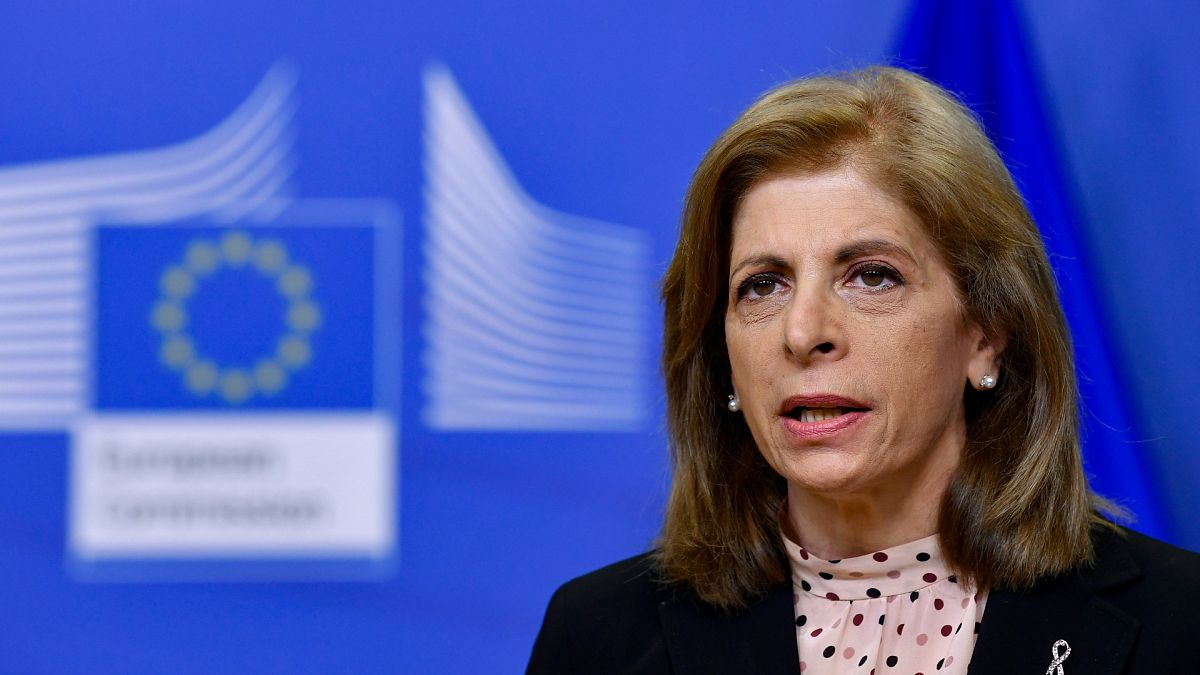"In the future, all companies producing vaccines against COVID-19 in the EU will have to provide early notification whenever they want to export vaccines to third countries," the bloc's Health Commissioner said following a call with AstraZeneca.
Brussels threatened on Monday to block exports of COVID-19 vaccines outside of the bloc over the AstraZeneca's announcement that deliveries will be reduced for a few weeks.
The pharmaceutical giant told the European Commission on Friday there would be delivery delays in the first quarter of this year — a week after Pfizer made a similar announcement.
Ministers in Britain, where AstraZeneca's vaccine was principally developed, said they opposed protectionism "in all its forms".
The EU Steering Board — made up of health officials from the Commission and member states — held a virtual meeting with AstraZeneca on Monday afternoon to discuss the issue but "the answers of the company have not been satisfactory so far," Health Commissioner Stella Kyriakides said in a statement.
A second meeting was held on Monday evening.
"The European Union will take any action required to protect its citizens," Kyriakides said in the statement.
She said the company's announcement that it intends to supply "considerable fewer doses" than agreed "is not acceptable", stressing that the bloc had "pre-financed the development of the vaccine and the production and wants to see the return."
"We want clarity on transactions and full transparency concerning the export of vaccines from the EU.
"In the future, all companies producing vaccines against COVID-19 in the EU will have to provide early notification whenever they want to export vaccines to third countries," she added. Humanitarian deliveries would not be affected.
Matt Hancock, the UK Health Secretary, said he was "confident" that the supply of Pfizer and AstraZeneca vaccines in his country would not be disrupted.
He told a panel event about the UK's health agenda for the G7: "I think protectionism is unfortunate, and especially so in the midst of a pandemic when we are working so closely together with countries right around the world.
"I'm sure that we can work with the EU to ensure that while transparency is welcome that no blockers are put in place."
AstraZeneca has a plant in the Netherlands, Pfizer has one in Belgium.
AstraZeneca must 'meet its contractual obligations'
The EU has secured about 2.3 billion doses of vaccines through Advance purchase Agreements struck with six pharmaceutical companies, including 300 million doses from AstraZeneca.
The EMA has not yet approved the jab which has already been rolled out in the UK, India, Mexico and Brazil. The European regulator is expected to give its approval on January 29.
The EU's vaccination campaign, which started in late December has so far relied on the jabs developed by Pfizer/BioNtech and Moderna.
But deliveries of the Pfizer vaccine to EU member states have also slowed down over the previous two weeks and until at least mid-February. The company said the reduced deliveries were to allow for it to ramp up manufacturing capacity but member states, putting further pressure on member states, which have come under heavy criticism for the slow roll-out of the vaccine.
EU chief Ursula von der Leyen spoke to AstraZeneca CEO Pascal Soriot on Monday morning, her spokesman Eric Mamer confirmed.
"She made it clear that she expects AstraZeneca to deliver on the contractual arrangement foreseen in the Advance Purchase Agreement," he said.
"She reminded Mr Soriot that the EU has invested a significant amount in the company upfront precisely to ensure that production is ramped up even before the conditional market authorisation is delivered by the European Medicines Agency (EMA).
"Of course, production issues can appear with a complex vaccine but we expect the company to find solutions and to exploit all possible flexibilities to deliver swiftly," he added.
The vaccine roll-out has been unequal across the bloc's 27 countries. As of January 24, just under 8.5 million of the EU's 450 million inhabitants had received at least one dose, according to the tally kept by Our World in Data.
Germany, Italy, Spain and France have each vaccinated over one million people but Malta and Denmark have inoculated the highest share of their population with 4.2 and 3.5 doses administered per 100 people — the average for the whole EU is 1.89 doses per 100 population.
